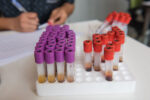Ultomiris Rapidly Eases Symptoms of Generalized MG in Phase 3 Trial
Written by |
Treatment with Ultomiris (ravulizumab-cwvz), a complement-blocking therapy, quickly eased symptom severity in adults with generalized myasthenia gravis (gMG), according to data from a Phase 3 trial.
Findings were shared at the Myasthenia Gravis Foundation of America (MGFA) Scientific Sessions 2021 in the presentation, “Efficacy and safety of ravulizumab, a long-acting terminal complement inhibitor, in adults with anti-acetylcholine receptor antibody-positive generalized myasthenia gravis: Results from the phase 3 CHAMPION MG study” (abstract No. 29).
“These data provide confidence that ravulizumab has the potential to become the new standard of care for gMG and may reduce patient burden with its less frequent dosing schedule, leading to better treatment adherence and patient satisfaction,” Laura Gault, vice president of neurology clinical development at Alexion Pharmaceuticals, the therapy’s developer, said in a written statement to Myasthenia Gravis News.
Ultomiris is a monoclonal antibody that works by blocking the activation of the complement cascade, a group of powerfully pro-inflammatory proteins in the blood. Atypical complement activity is thought to help drive gMG.
Alexion sponsored the Phase 3 CHAMPION MG (NCT03920293) trial, which enrolled 175 adults with gMG at 85 centers around the globe. Its main goal was to determine the effects of Ultomiris relative to placebo, as measured through changes since treatment initiation in the Myasthenia Gravis Activities of Daily Living (MG-ADL) score, a patient-reported measure of symptom severity where higher scores (range, 0–24) indicate worse symptoms.
Most of the trial’s participants were white (73%), with an average age of 55.6, and about half were female. All were positive for antibodies targeting the acetylcholine receptor (AChR), the most common cause of MG, and their mean MG-ADL total score was 9 (range, 6–24) at study entry.
Patients were randomized to either Ultomiris (with dosing based on weight) or a placebo, administered by infusion into the bloodstream every eight weeks for 26 weeks (about half a year) after an initial loading dose. Those who completed the placebo-controlled trial had the option of enrolling in its open-label extension, where all are being given Ultomiris and monitored for the treatment’s safety and efficacy.
CHAMPION MG results after 26 weeks showed an average decrease in the MG-ADL score of 1.4 points among patients on placebo. This drop was significantly greater, 3.1 points, for those receiving Ultomiris, meeting the trial’s primary goal.
The difference in MG-ADL score changes among these patient groups was significant as soon as one week after starting treatment and sustained throughout the 26-week trial, additional analyses showed.
Similar group differences were observed using the Quantitative Myasthenia Gravis (QMG) score, a clinician-reported measure of disease severity. Three times as many patients on Ultomiris, compared with those on placebo, experienced a decrease of at least five points in QMG score, indicating substantial improvement.
Improvements in QMG scores were also observed as early as one week after starting with Ultomiris and sustained throughout the study.
Other measures used to assess fatigue and health-related quality of life generally showed trends in favor of Ultomiris over placebo, but these differences were not statistically significant.
Ultomiris was generally well tolerated in these gMG patients. Adverse events (side effects) deemed related to treatment were reported in 34% of patients on Ultomiris, and an equal proportion of those on placebo. The most common included headache, diarrhea, and nausea, and most were reported to be mild or moderate in severity.
Trial safety data, presented with more detail earlier, were “consistent with that observed in Phase 3 studies” of Ultomiris in other diseases, the researchers noted.
Serious adverse events thought related to Ultomiris’ use were reported in two patients, and four such serious events were reported in placebo group patients. Two patients on Ultomiris died during the trial — one due to COVID-19 and the other after a cerebral hemorrhage or bleeding in the brain.
The fact that this trial was conducted during the COVID-19 pandemic was a noted study limitation. According to its research team, the pandemic may have affected some outcomes, including reported changes in life quality. Still, less than 1% of study visits were missed due to COVID-19.
“Initial results from this Phase 3 trial demonstrate that treatment with ravulizumab resulted in rapid and sustained improvement in gMG symptoms, meeting the primary endpoint of change from baseline in the Myasthenia Gravis-Activities of Daily Living Profile (MG-ADL) total score, a patient-reported assessment, at Week 26,” Gault said.
Among those patients in the trial’s extension who finished its 26 weeks of Ultomiris’ use, evidence to date shows that “the positive treatment effect was maintained through a total of 52 weeks,” Gault added.
Based on these findings, Alexion plans to request Ultomiris be approved to treat gMG in the U.S. and elsewhere.
“We are looking forward to announcing full Phase 3 results for ravulizumab in gMG in 2022 and are having conversations with regulatory authorities worldwide,” Gault said. “We are also committed to investigating ravulizumab in other neurological rare diseases, such as NMOSD [neuromyelitis optica spectrum disorder].”
Ultomiris is currently approved to treat atypical hemolytic uremic syndrome (aHUS) and paroxysmal nocturnal hemoglobinuria (PNH), both of which are autoimmune conditions where abnormal complement activity leads to the destruction of red blood cells.






Leave a comment
Fill in the required fields to post. Your email address will not be published.